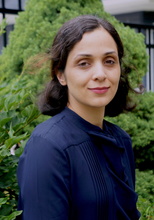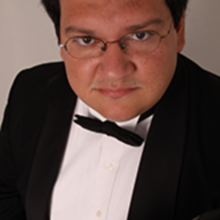By Charlotte Brookins
Faculty in the College of Liberal Arts and Sciences are doing impactful and interesting work across disciplines. Learn more about the research and work of Zahra Aminzare, Jorge Montilla Moreno, and Isaac Peterson.
Zahra Aminzare is an assistant professor in the Department of Mathematics.
What is the focus of your work?

I am deeply engaged in the interdisciplinary field of mathematical biology. My primary research goal is to generate predictions about the mechanisms underlying the collective behavior of biological networks. I specifically focus on employing and developing mathematical models, techniques in dynamical systems and control theory, and computational methods to model and analyze various biological phenomena.
My work spans diverse biological networks, including small neural circuits like central pattern generators in invertebrate thoracic ganglia responsible for generating locomotive activities, populations of bacteria (mainly E. coli) exhibiting movement towards food or evasion from poison, and the study of coupled scolopale cells (parts of sensory neurons) in auditory systems.
Tell us about the broad impact you’d like it to have.
In addition to impacting the field of mathematics, my research projects have far-reaching implications across various disciplines. They offer valuable insights for biologists and neuroscientists by providing a deeper understanding of how biological systems generate stable and robust behaviors. Furthermore, these findings hold relevance for engineers and entomologists, contributing to the advancement of our understanding of neuronal mechanisms controlling locomotion and supporting the development of more sophisticated biologically inspired robotic systems.
Beyond the scientific community, I am dedicated to making the interdisciplinary field of mathematical biology accessible to a wider population, particularly young people from underrepresented groups. In mathematical terms, I am more interested in pulling the lower boundary than pushing the upper boundary.
I also find joy in contributing to the community by running math clubs for elementary students. Working with these young minds not only allows me to share my passion for mathematics but also fosters an early interest in the subject, inspiring the next generation of problem solvers.
What excites you about the environment in CLAS?
Coming from an interdisciplinary research background, it is crucial for my career to engage in discussions and collaborations with individuals from diverse disciplines. One captivating aspect of the CLAS environment is the strong emphasis on collaboration and intellectual curiosity among its members.
What are your hobbies and pursuits outside of work?
I dedicate most of my time outside of work to my family, enjoying moments with my husband and our two- and eight-year-old children. In the precious moments of solitude, typically lasting less than half an hour a day, I do meditation and read books. In the past, when I had more time, I loved running in the woods and spending time with my friends.
Any favorite things to do in Iowa City?
I enjoy drinking coffee at Prairie Lights Café with a friend, hiking in Woodpecker Park, and walking around Terry Trueblood Lake.
Jorge Montilla Moreno is an assistant professor in the School of Music.
What is the focus of your work?

As a classically trained clarinet performer, pedagogue, and composer, I am deliberate in avoiding a singular focus in my work. This precaution arises from my desire to not be pigeonholed as a musician exclusively aligned with a particular musical genre.
My extensive preparation encompasses diverse aspects of the music industry, including the performance of clarinet music across various styles (including those specific to geographic regions such as klezmer, jazz, and Latin American genres), pedagogy for all members of the clarinet family, and the creation of arrangements and compositions for clarinet ensembles. In addition to this wide range of topics, I have identified two specialized areas within the music domain: the performance, composition, pedagogy, and commissioning of pieces in the Latin American style; and the analogous engagement with the Eb clarinet, one of the smaller clarinets still in use.
Tell us about the broad impact you’d like it to have.
In my capacity as an assistant professor, particularly at the University of Iowa, my aim is to elevate the clarinet studio to national and international eminence. I envision achieving this by equipping students with the skills and competitiveness requisite for success in the global music arena. I anticipate that the incorporation of the focus of my work in my roles as an educator and a performer will foster awareness of these subjects, associating them with both my name and that of the University of Iowa.
What excites you about the environment in CLAS?
The CLAS environment is characterized by its amicable atmosphere. I consider myself fortunate to collaborate with exceptional colleagues not only within the School of Music but also across other academic departments.
What are your hobbies and pursuits outside of work?
Outside of work, my primary interests revolve around languages and cooking. While I do not aspire to pursue cooking beyond a hobby, I am actively engaged in acquiring proficiency in a new language, Czech, to augment my existing linguistic repertoire, which includes Portuguese, French, Italian, English, and Spanish.
Any favorite things to do in Iowa City?
Iowa City, with its vibrant ambiance throughout the seasons, offers a multitude of engaging opportunities. Personally, I enjoy exploring and sampling new restaurants in the area.
Isaac Petersen is an assistant professor in the Department of Psychological and Brain Sciences.
What is the focus of your work?

I am interested in how children develop individual differences in adjustment, including behavior problems and competencies. I am particularly interested in how children develop externalizing behavior problems (e.g., aggression, hyperactivity, conduct problems) and underlying self-regulation difficulties as a function of bio-psycho-social processes including brain functioning, parenting, temperament, and language skills.
Tell us about the broad impact you’d like it to have.
My goal is for the assessment instruments we are developing and the risk mechanisms we are identifying to lead to earlier identification of children at risk for the development of behavior problems and, ultimately, more effective intervention and prevention.
What excites you about the environment in CLAS?
I enjoy collaborating with the interdisciplinary group of scholars across the wide range of departments and disciplines in CLAS.
What are your hobbies and pursuits outside of work?
I enjoy playing basketball, fishing, grilling, and spending time with friends and family.
Any favorite things to do in Iowa City?
Some of my favorite things to do in Iowa City include biking along the riverfront, picking apples at Wilson's Orchard, and attending the fun summer festivals.